London
David Exwood’s glossy, chestnut-brown Sussex cattle are brought in during the winter months and, apart from the bellowing that comes from their barns, his 1,000 hectare farm is quiet. But while the inaction on his farm, near Horsham, southeast England, is typical of many in the colder months, it belies tensions across British agriculture as the sector braces for the New Year. “Brexit is just all about damage limitation, really,” Exwood told AFP, just days away from Britain’s departure from the European Union single market and customs union on December 31. “It’s damaging our reputation as a country, our economy. Now I’ve just got to try and prevent it damaging my business.” Since Britons voted to leave the EU in 2016, farmers have had to contend with four years of uncertainty. Would tariffs be placed on goods exported to the bloc? What changes might be made to farming subsidies previously decided by Brussels through the Common Agricultural Policy. Britain’s Department for Environment, Food and Rural Affairs answered some of those questions on Thursday, as Britain’s trade deal with the EU was being finalised. The UK’s £5 billion ($6.8 billion, EUR5.6 billion) in animal exports to the continent would continue after Brussels said it had met the necessary animal health standards. Exwood, whose farm holds 600 cattle and 800 hectares of arable crops, has been better insulated against the prospect of a no-deal Brexit and the tariffs on livestock exports that would follow. —AFP










